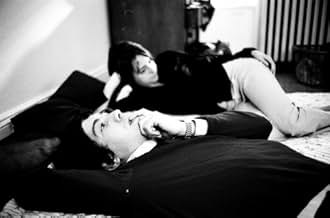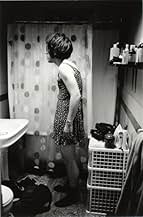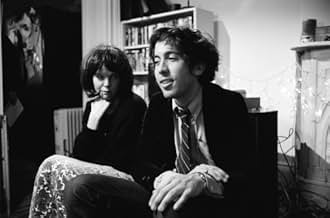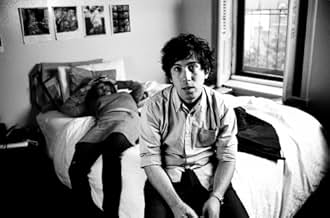Alan is a musician who leaves a busted-up band for New York, and a new musical voyage. He tries to stay focused and fends off all manner of distractions, including the attraction to his good... Read allAlan is a musician who leaves a busted-up band for New York, and a new musical voyage. He tries to stay focused and fends off all manner of distractions, including the attraction to his good friend's girlfriend.Alan is a musician who leaves a busted-up band for New York, and a new musical voyage. He tries to stay focused and fends off all manner of distractions, including the attraction to his good friend's girlfriend.
- Awards
- 2 wins & 3 nominations total
- Director
- Writer
- All cast & crew
- Production, box office & more at IMDbPro
Featured reviews
Here's a drama of sorts, done up in grainy, black & white, faux verité style to simulate a documentary of a moveable feast of trust children and other well heeled, well educated slackers, all Brooklyn apartment denizens, whom we follow around during their standard issue daily lives. I suspect - though I don't know and haven't read - that the actors were told the general arc of the film and assigned broad outlines of their characters (maybe they even helped to develop them: the method of the English director, Mike Leigh), then allowed to ad lib within those limits. The dialogue surely has that feel.
The major subtext here is friendship. The action, if you can call a long series of sedentary conversations that, centers around a trio of characters: Lawrence (Andrew Bujalski, also the writer-director), his girlfriend Ellie (Rachel Clift), and Lawrence's long time best friend Alan (Justin Rice), who has just come to town after his rock band, "The Bumblebees," had broken up in Boston. A crackle of attraction fills the air between Ellie and Alan, and a lingering issue throughout the film is what will develop between them, and what will become of Lawrence's ties to both.
The principals and their friends prattle on about such crucial matters as the iron deficiency that can develop from vegan diets (Alan's friend's solution to this was: eat meat); honesty; what to do after someone kisses you; making pop music and performance art; taking "proactive control of one's destiny," as Ellie puts it to Lawrence at one point; obtaining and smoking good weed and occasionally maybe scoring some cocaine, though it's not a big deal; hitting Dad up for dollars; Buddhism; elliptical references to some other people - erstwhile close chums - getting married. .
Those are the searingly important issues of the day for these young adults. Nothing about politics, social or global issues. Not a word about career, except for Alan's aspirations to make it as a rocker (Mr. Rice has an arresting singing voice with a faintly Irish lilt to it). The talk goes on and on for 110 minutes. It's "My Dinner with Andre," without Andre. And without dinner. No arc. No resolution. No character changes. Not even an interesting idea or two. Just slices of daily life, like I said. The whole enterprise feels (a) realistic and (b) boring, agonizingly boring.
One saving grace is Mr. Rice, whose Alan is a shy, beguiling, endearing rogue of a fellow for sure. The other thing is absence of cigarettes. For the longest time I thought this would be a fag-free movie, and it almost is. Only in the 85th minute was one cigarette smoked, shared between Ellie and Alan as a sort of 40s style sexual signal. And not again. This film is marginally better than Lila Yomtoob's recent movie "High Life," about the same Brooklyn-dwelling, beer drinking young slacker social set.
My partner and I have ties to a group of "younger" adults, now approaching 40, who attended college together and then migrated more-or-less as a group to San Francisco, where most of them continue to live. Their bonds remain palpable and enduring. A dozen years ago their daily lives might have looked, to an outside viewer, a lot like the people in this film. Today it's different, but only in some respects. Most have solved the problem of vocation, one way or another, and they are more interesting than the 20-somethings because of it.
One has followed a traveling circus, becoming proficient as a sword swallower. When not on the road he lives in a warehouse by the Bay with his partner, a woman who arranges sets for the opera. Another flies in for parties from D.C., where he now works for the IMF. Yet another is an agronomist who is about to finish law school, and one sells art at an upmarket gallery near Union Square. Our friend, who has lived in Japan and studied Butoh dancing, is now a freelance, self-taught finish carpenter and fine cabinet maker.
Our friend only became political in his early 30s, shifting dramatically from indifference to activism. In terms of their intimate lives - their capacities to establish and sustain romantic or conjugal relationships - it's still a much more mixed picture for our friend's group. Some have married, others not. For several, although they are highly personable individuals, "permanent" love relationships still remain just beyond their reach.
I bring up this group not so much to suggest those things that may and may not change as singles move from their 20s into their 30s, but primarily to make a very different point. Our friend's friends would have no interest in or even knowledge of us, nor is it likely that we would know or care about them, fascinating people though they are, were it not for the connections the social network that exists through our friend. He was my stepson's dearest chum in childhood; my partner has known him since he was 5, and I have enjoyed his company for over 10 years. It is because of our friend that his circle interests us so.
To sharpen the point, there are only two reasons for anybody to care about the group of kids in this movie: (a) you identify with them: you're a kid yourself, in fact or in terms of your own psychological makeup; or (b) one of them IS your daughter, son, or a longstanding friend of theirs. For everybody else, and that's most of us, this film basically sucks. My grades: 5/10, C. (Seen on 02/09/06).
The major subtext here is friendship. The action, if you can call a long series of sedentary conversations that, centers around a trio of characters: Lawrence (Andrew Bujalski, also the writer-director), his girlfriend Ellie (Rachel Clift), and Lawrence's long time best friend Alan (Justin Rice), who has just come to town after his rock band, "The Bumblebees," had broken up in Boston. A crackle of attraction fills the air between Ellie and Alan, and a lingering issue throughout the film is what will develop between them, and what will become of Lawrence's ties to both.
The principals and their friends prattle on about such crucial matters as the iron deficiency that can develop from vegan diets (Alan's friend's solution to this was: eat meat); honesty; what to do after someone kisses you; making pop music and performance art; taking "proactive control of one's destiny," as Ellie puts it to Lawrence at one point; obtaining and smoking good weed and occasionally maybe scoring some cocaine, though it's not a big deal; hitting Dad up for dollars; Buddhism; elliptical references to some other people - erstwhile close chums - getting married. .
Those are the searingly important issues of the day for these young adults. Nothing about politics, social or global issues. Not a word about career, except for Alan's aspirations to make it as a rocker (Mr. Rice has an arresting singing voice with a faintly Irish lilt to it). The talk goes on and on for 110 minutes. It's "My Dinner with Andre," without Andre. And without dinner. No arc. No resolution. No character changes. Not even an interesting idea or two. Just slices of daily life, like I said. The whole enterprise feels (a) realistic and (b) boring, agonizingly boring.
One saving grace is Mr. Rice, whose Alan is a shy, beguiling, endearing rogue of a fellow for sure. The other thing is absence of cigarettes. For the longest time I thought this would be a fag-free movie, and it almost is. Only in the 85th minute was one cigarette smoked, shared between Ellie and Alan as a sort of 40s style sexual signal. And not again. This film is marginally better than Lila Yomtoob's recent movie "High Life," about the same Brooklyn-dwelling, beer drinking young slacker social set.
My partner and I have ties to a group of "younger" adults, now approaching 40, who attended college together and then migrated more-or-less as a group to San Francisco, where most of them continue to live. Their bonds remain palpable and enduring. A dozen years ago their daily lives might have looked, to an outside viewer, a lot like the people in this film. Today it's different, but only in some respects. Most have solved the problem of vocation, one way or another, and they are more interesting than the 20-somethings because of it.
One has followed a traveling circus, becoming proficient as a sword swallower. When not on the road he lives in a warehouse by the Bay with his partner, a woman who arranges sets for the opera. Another flies in for parties from D.C., where he now works for the IMF. Yet another is an agronomist who is about to finish law school, and one sells art at an upmarket gallery near Union Square. Our friend, who has lived in Japan and studied Butoh dancing, is now a freelance, self-taught finish carpenter and fine cabinet maker.
Our friend only became political in his early 30s, shifting dramatically from indifference to activism. In terms of their intimate lives - their capacities to establish and sustain romantic or conjugal relationships - it's still a much more mixed picture for our friend's group. Some have married, others not. For several, although they are highly personable individuals, "permanent" love relationships still remain just beyond their reach.
I bring up this group not so much to suggest those things that may and may not change as singles move from their 20s into their 30s, but primarily to make a very different point. Our friend's friends would have no interest in or even knowledge of us, nor is it likely that we would know or care about them, fascinating people though they are, were it not for the connections the social network that exists through our friend. He was my stepson's dearest chum in childhood; my partner has known him since he was 5, and I have enjoyed his company for over 10 years. It is because of our friend that his circle interests us so.
To sharpen the point, there are only two reasons for anybody to care about the group of kids in this movie: (a) you identify with them: you're a kid yourself, in fact or in terms of your own psychological makeup; or (b) one of them IS your daughter, son, or a longstanding friend of theirs. For everybody else, and that's most of us, this film basically sucks. My grades: 5/10, C. (Seen on 02/09/06).
I saw this film yesterday at the Independent Film Festival of Boston and was pleasantly surprised. I just randomly picked it because i wanted to see something at the IFFB, and i loved the movie. Andrew Bujalski did a great job writing this conversion driven movie. The conversation felt so natural that I thought most of it was ad-libbed, but after the film he told us that while parts of the script were somewhat left open for ad-libbing, it was mostly written dialog. The main character, Alan (Justin Rice) has this wonderfully unique charisma, which really pulled me into the movie. Mr. Bujalski told us that much of that character was based on real life Justin Rice, and it came across well. I would definitely recommend checking out this movie if you can, especially for fans of Woody Allen, and it reminded me of Wes Anderson's work in some ways, probably just because of the characters.
I respect this movie very much. It does an excellent job of creating realistic situations and natural dialogue. But it almost feels too real at times. Watching this movie is as if I was sitting in a room watching my friends talk and mentally filming it. I respect the attempt but there's a reason why movies are scripted! Real life conversations can get boring at times. And in this movie, the director let many scenes run far longer than they needed to. And the lack of any semblance of a real story emphasizes its quality as a snippet of a week or so in the lives of three 20s New Yorkers.
Mutual Appreciation is one of the first I've seen where I feel totally like I am watching real life. And this creates some very funny moments. But it also leads to many dull points and a lack of direction to the film, which is easily recognized as the intention of the director. But I don't think it makes a great film. A film to be respected for its attempt, but not necessarily enjoyable or a great film.
Mutual Appreciation is one of the first I've seen where I feel totally like I am watching real life. And this creates some very funny moments. But it also leads to many dull points and a lack of direction to the film, which is easily recognized as the intention of the director. But I don't think it makes a great film. A film to be respected for its attempt, but not necessarily enjoyable or a great film.
I bet Andrew Bujalski is sick of reading that he's the voice of his generation, when most of that neo-slacker demographic has never had the opportunity to see his films. Like Funny Ha Ha, Mutual Appreciation is hardly your standard Amerindie
It's shot on 16mm black-and-white, thus confirming Bujalski's allegiance to a strain of maverick filmsShadows, Stranger than Paradise, Clerksthat bring poignantly accurate renditions of subcultures of which their directors have intimate knowledge to otherwise homogenized screens. While Cassavetes is the most obvious influence, one might also regard Funny Ha Ha and Mutual Appreciationas Rohmer without subtitles. Both films are "moral tales" whose characters leap to language as offense and defense.Amy Taubin
Throughout history, there have been people who have changed the world. Edison gave us the light bulb; Guttenburg the printing press. I feel I am offering a public service for all mankind just as great by warning people to stay away from "Mutual Appreciation".
It is perhaps the most monotonous movie I have ever seen. Nothing happens. These slackers, who are really disturbing to look at, just sit there and talk. I wouldn't have a problem with that if they had something interesting to say. They don't. And they have nothing to say in the most dreary manner possible. No ups, no downs. Just flat, unemotional speaking. It is just true torture. Please, please, for all that is good and holy, ignore the critics who liked this and avoid this horrific piece of...film.
It is perhaps the most monotonous movie I have ever seen. Nothing happens. These slackers, who are really disturbing to look at, just sit there and talk. I wouldn't have a problem with that if they had something interesting to say. They don't. And they have nothing to say in the most dreary manner possible. No ups, no downs. Just flat, unemotional speaking. It is just true torture. Please, please, for all that is good and holy, ignore the critics who liked this and avoid this horrific piece of...film.
Did you know
- ConnectionsSpin-off Peoples House (2007)
Details
Box office
- Gross US & Canada
- $103,509
- Opening weekend US & Canada
- $13,141
- Sep 3, 2006
- Gross worldwide
- $121,292
- Runtime
- 1h 49m(109 min)
- Color
- Aspect ratio
- 1.66 : 1
Contribute to this page
Suggest an edit or add missing content























